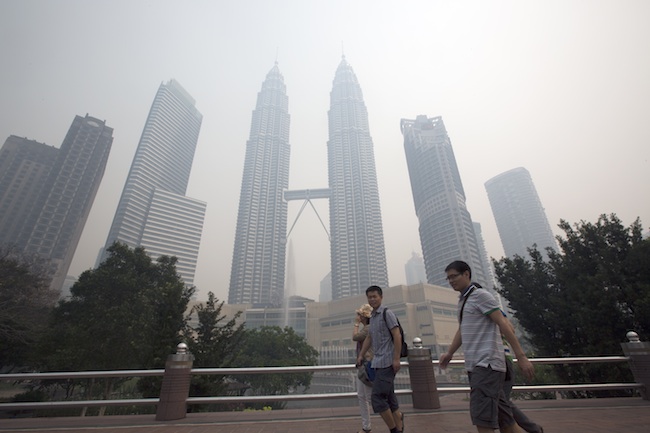SUMMARY
This is AI generated summarization, which may have errors. For context, always refer to the full article.

KUALA LUMPUR, Malaysia (UPDATE) – Malaysia’s government declared a state of emergency in two southern districts choked by smoke from forest fires in Indonesia as air pollution levels reached a 16-year high on Sunday, June 23.
Environment minister G. Palanivel said the air pollutant index (API) hit 750 in the town of Muar — the highest reading seen in Malaysia for 16 years — Sunday morning, with two other southern towns also reaching hazardous levels.
“The prime minister has signed a declaration of emergency for Muar and Ledang districts,” Palanivel told AFP in a text message.
An API level of more than 300 is defined as “hazardous” in Malaysia.
Haze is an annual problem during drier summer months, when westerly monsoon winds blow smoke from forest fires and slash-and-burn land-clearing on the huge Indonesian island of Sumatra, which lies across the Malacca Strait from Malaysia and Singapore.
Air quality in the Malaysian capital Kuala Lumpur, which had so far escaped major impact from the current haze, also took a turn for the worse.
The smell of smoke permeated the city and the twin Petronas Towers that dominate the skyline were invisible from just a short distance away, while many city residents donned facial masks.
Malaysia’s API rated the capital’s air “unhealthy”.
Malaysia’s index differs from Singapore’s, which surpassed its critical 400 level on Friday, indicating potentially life-threatening conditions for the ill and elderly, though pollution in the city-state has since eased.
The Muar pollution reading was Malaysia’s highest since the API hit 860 during a severe 1997-1998 haze crisis that gripped the region and thrust the issue onto the Southeast Asian agenda.
An emergency was also declared in 2005 when readings soared above 500.
No classes; Non-essential work shut down
Under the emergency, all non-essential places of employment in the private and public sector are advised to shut down.
Authorities also decided late Sunday to close all schools in the capital and at least four states which have been hit by unhealthy air.
Hundreds of schools have been closed since Thursday, June 20, in the southern Malaysian state of Johor, which borders Singapore.
The government announced Sunday afternoon that it would commence cloud-seeding in hopes that rain will alleviate the pollution in the worst-hit areas.
The annual problem is blamed by Indonesia’s neighbors for affecting tourism and public health.
The crisis has brought more negative publicity for big palm oil companies — Indonesian, Singaporean and Malaysian — which deforest vast swathes of Sumatra, as well as other areas of Indonesia and Malaysia, although the companies insist they have strict “no burn” policies.
Indonesia’s government has outlawed the use of fire to clear land, but weak enforcement means the ban is largely ignored.
Singapore and Indonesia have lashed out at each other in recent days. Malaysia’s government has so far avoided strong criticism of its big Southeast Asian neighbor.
Indonesia, meanwhile, has blamed Malaysian and Singapore-based palm oil companies for allowing slash and burn on estates they own on Sumatra.
Environmental group Greenpeace said Saturday that NASA data indicated hundreds of fires were burning in palm oil concessions owned by Indonesian, Malaysian and Singaporean companies.
In 1997-1998, the haze cost Southeast Asia an estimated $9 billion from disruptions to air travel and other business activities. – Rappler.com
Add a comment
How does this make you feel?
There are no comments yet. Add your comment to start the conversation.